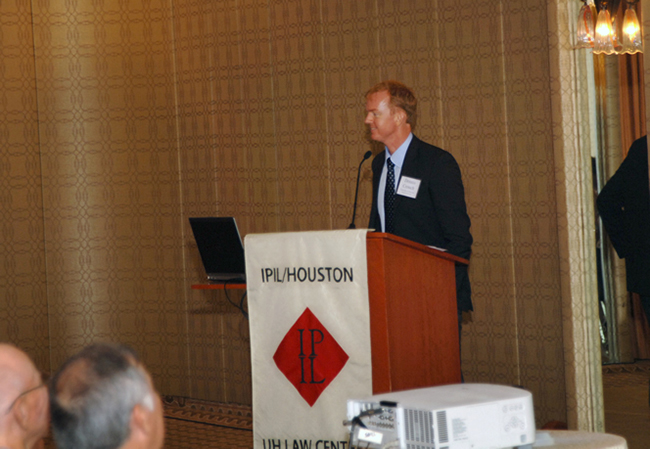
 Photo credit: University of Houston Law Center
Photo credit: University of Houston Law Center
YESTERDAY, Crouch's series of anti-PTAB posts (e.g. [1, 2]) culminated in admission of his own error. He then wrote about "Dismantling Inter Partes Review" (the very essence of PTAB). It's no secret that he is a PTAB foe, but nowadays he makes it far too obvious.
"We expect the patent 'industry' to use this as an opportunity to try to destroy PTAB."It's not hard to know which side he is on, having bashed PTAB for a very long time. He surely knows what's at stake here. He ends with these words: "One way that the court could rule against Oil States is by ruling that the IPR cancellation process involves “public rights” rather than private property rights."
Same old nonsense from him, comparing patents to "property" or "rights" (they are neither).
We expect the patent 'industry' to use this as an opportunity to try to destroy PTAB. Here is one of those people, a PTAB basher, saying that "PTAB finds invention that passes 101! https://e-foia.uspto.gov/Foia/RetrievePdf?system=BPAI&flNm=fd2016003171-08-22-2017-1 … identifying route 4 medical procedure on PC passes "significantly more" test..."
Here is Crouch admitting his own mistake:
The historic point here – although the it did not actually revoke any patents after 1779 — the privy council seemingly held that power up until at least 1902.
I only had a chance to look through one English patent issued during this time period – the 1896 Marconi patent. The patent does include the caveat that permits the Privy Council to void the patent – following the form language almost identically.
One of the criticisms frequently leveled against inter partes reviews (IPRs) is that people file multiple IPRs; they file two, three, four IPR petitions in order to harass a patent owner. Complaints notwithstanding, the data shows just how infrequent a practice this is. The data also shows that the blame for the occasions when this does occur lies squarely with the patent owner’s own choices.
The truth is that multiple petitions are rare. And when they are filed, it’s typically because patent owners have filed patents with so many claims that you need multiple petitions just to fit your arguments into the word limit.
[...]
In other words, around 0.1% of patents in force have actually had any petitions filed against them.
It’s not true that most patents that are asserted in litigation have IPRs filed against them. On the contrary—about 85% of patents asserted in litigation are not challenged in an IPR!
In other words, only 0.1% of all patents and only 15% of patents that have been asserted in litigation have seen any IPRs filed against them. Most patents never see a petition at all, much less multiple petitions.
The Supreme Court has a chance to help banish patent trolls back under the bridge where they belong. In the fall session, the Court will hear Oil States Energy Service v. Greene's Energy Group – a case that has massive implications for the future of patent law and U.S. innovation.
Patent trolls (sometimes called non-practicing entities, or NPEs) don't actively create any goods or provide any services. Instead, they go after those who do, filing bogus patent infringement lawsuits. Ultimately, their goal is to frighten businesses into settling outside of court, collecting as much money as they can.
More than 80 percent of trolls' victims are small and medium-sized businesses, and the cost to defendants to fight a patent-infringement lawsuit can easily reach $1 million. That's why it's often more cost-effective to simply pay off the trolls.
"Trolls often aggressively push for extortionate settlements that far surpass the value of the [intellectual property] because they know many companies will choose to settle, rather than get embroiled in an expensive and drawn-out lawsuit," Ira Blumberg, a former patent-troll lawyer, explained: "Their actions can wreak havoc on tech companies of all sizes."